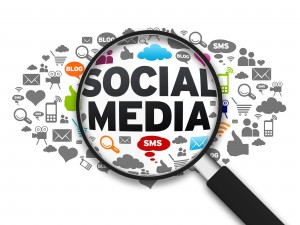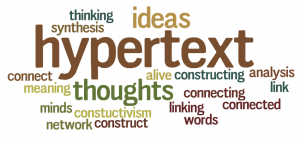Question
At the beginning of this lesson I pointed to the idea that technological advances in communication tools have been part of the impetus to rethink the divisive and hierarchical categorizing of literature and orality, and suggested that this is happening for a number of reasons. I’d like you to consider two aspects of digital literature: 1) social media tools that enable widespread publication, without publishers, and 2) Hypertext, which is the name for the text that lies beyond the text you are reading, until you click. How do you think these capabilities might be impacting literature and story?
In answering this question, I would like to highlight the efficiency of distributing literature and story through social media and the aid in which hypertext poses for readers. For my own organization and sanity I am dividing my response into two parts to discuss the two aspects of this question.
Part 1: Social Media

Publishing content on the www is as simple to do as it is for the audience to read. Through the social media source Facebook, account holders are able to publish their own stories for their friends to read and they can also share with their friends almost any page on the www through their Facebook profile. Among many other things, this enables Facebook users to share articles they enjoyed reading or recommend books they have read to their friends making the www highly efficient in distributing literature.
The example I thought of almost immediately when thinking about the impact of social media on literature actually comes from Facebook. I have two aunties that live in Toronto and are Canadian authors, Kelly Robson and Alyx Dellamonica. I have them on Facebook and through what they share on their profiles I have been introduced to an extensive amount of literature that I would have otherwise never known about. Being that they are authors, they are immersed in the field of literature leading them to have many Facebook friends who are also authors. Generally how I learn about new Canadian authors and texts on Facebook goes like this: One of their facebook friends will share a link on their timeline regarding a book that they had recently written or read, this link then gets shared by Kelly and/or Alyx to all of their Facebook friends which distribute’s this text to thousands of people including myself.
The www makes it so incredibly easy to access Canadian literature and interact with authors as you can find full texts published online with a comment function at the bottom of the page. This comment function enables the reader on the www to become the listener of stories as well as a writer. They are given the opportunity to write about their experience with the text and give their opinions and interpretations of it. This creates an interaction with the author as they are able to receive feedback from their readers. The author is able to ‘listen’ to the comments left by other readers around the world and interact with their analysis. Being that readers on the www can also be writers and listeners, the blur between literacy and orality discussed in Lesson 1.2 is created.
Part 2: Hypertext

I think hypertext is a phenomenal function as it gives you immediate access to further information regarding any topic that is being discussed. As I have exemplified in this blog post, hypertext gives readers an opportunity to be directed to a new webpage that can a) help them to gain a greater understanding of the topic being discussed b) provide web pages as examples of particular topics. In terms of the impact hypertext has upon literature and story, it enables readers to be more involved with the text as they are given the tools to broaden their understanding.
Thanks for reading! 🙂
Caitlyn, the first half of your post regarding your ability to access extensive amounts of literature via your author aunties got me thinking. It’s so easy to make broad claims about our increased access to information via the internet. It has become almost cliche. However, your story about how access to your aunties’ inner-circle of author acquaintances via Facebook has directly impacted what you’ve been reading gives that broad idea much greater definition. It makes it personal. It’s not a super-amazing realization I’ve had, but it’s created a subtle change in how I see our relationship with each other and the internet. Before such technological communication methods, you would have had to live in the same town as your aunts, and probably met them for coffee at least once a week to be able to benefit from their authors circle like you have. Now, with the internet, we are allowed access to such circles with just a couple taps of our finger. I’m curious, do you think without the internet you would have kept in communication with your aunts in person or by telephone? Or do you think the internet has allowed you to maintain more of a relationship with them than you otherwise would have? I’m constantly trying to figure out if the internet is helping our ability to connect and communicate or hindering it.
Hi Sierra!
To answer your questions, yes I would have kept in contact with them through telephone if the internet did not exist. However, I do think the internet has really allowed me to maintain a better relationship with them. Through Facebook and instagram alone I am able to keep updated with their lives just as they are with mine. I do feel like the internet is helping our ability to keep updated with people’s lives but I do think that it has hindered our social skills and has made us more anti-social. Because I am able to look up my aunt’s facebook and know exactly what she has been up too, I don’t call her to have an actual conversation because I already ‘know’ how she is doing.
Thanks for the questions 🙂
Hi Caitlyn!
For this week, I also wrote a response on this question and felt like it was really interesting as well. I mentioned in my blog about Facebook too and when reading your post, I got some new perspectives on it. I think Facebook has grew in many ways where people can also share unique things on the networking site to convey their own stories. The way people tell their stories can be so different because one may share articles, another may post videos, and so forth.
I do agree that the www opens more doors for people to learn and access to Canadian literature more easily. You mentioned that people can retrieve full text published online, but one question I have in mind would be… are there any difference when reading let’s say someone’s story that is published in a actual text written book versus reading it online? One thing that came up for me was that, I think the experience of receiving that story will be different. One is reading it through a computer screen and another is actually holding the physical book and reading the written/or typed sentences. Do you think by having articles or information that tell stories online affect the way we understand someone’s story or the story itself then?
Once again, great post!
Karen
Hi Karen!
I really enjoy these questions and to be brief, yes I absolutely think there is a difference in reading a story online rather than a book. I feel like holding a book in your hand and flipping the pages makes the reading experience more personal. When reading a physical text, I absorb the information quicker and more efficiently than reading something online. I feel like when I read something online there is a wall between me and the text and I don’t take as much out of it. All in all, I truly think that the experience of reading a physical text rather than an online text is more gratifying and effective because it is more personal.
Thank you!
Caitlyn 😀
Hi Caitlyn. I liked reading your thoughts on how social media is changing literature. Hypertext is an interesting one that I never really thought about until this course. I think it has changed how author’s with online content write as well. It occurred to me that now this allows you to write about so much more without making a piece particularly long. Rather than a story being a stand-alone piece, it is now just a point in a web and hypertext lets the author determine what that web is. They can connect to all sorts of ideas that interest them but are not part of that topic directly making their article the start of a much bigger information set.
Hi Maryam,
Thanks for the comment! I really like your assertion that hypertext “allows you to write about so much more without making a piece particularly long.” Hypertext really does enable a writer to insert a plethora of information that is not necessary to understand the text but allows the reader to educate themselves on related topics. I find hypertext to be extremely effective in creating a large information set for a reader to indulge in if they want too.
Caitlyn 🙂
Hi Cait!
That’s so cool that your aunties are authors! I clicked on the link to the short novella and the pitch seemed interesting enough so I’ll be keeping it on one of my tabs for now… But I think the function of this, in addition to what you have said, is that it gives readers a choice in what they read and ingest. It becomes a really selective process and while it does allow people to gain a better understanding of a topic, it also gives a sense that the knowledge will always be THERE and all people have to do is search it up again. Does that put a stop to our knowledge and curiosity? Sometimes I think so, because I open tabs, wanting to read them later then a few days later just skim over it and close it without paying much attention. The ease of accessibility of information and literature perhaps makes it a less pressing matter, as in it’s a less urgent thirst for knowledge because what’s the hurry? It’s always going to be there! What are your thoughts on this?
Thanks for reading my comment!
Cherie.
Hi Cherie,
I find your comment really interesting and I completely agree with you, I feel like having so much information readily available hinders our learning abilities. Just like you, I have totally opened a bunch of tabs or bookmarked articles that I think would be interesting but don’t want to read at the moment. However, I almost never go back to those pages and read them because I know that it will always be there and like you said, “what’s the hurry?”.
Caitlyn 🙂
Hi Caitlyn, just testing your comments for you 🙂